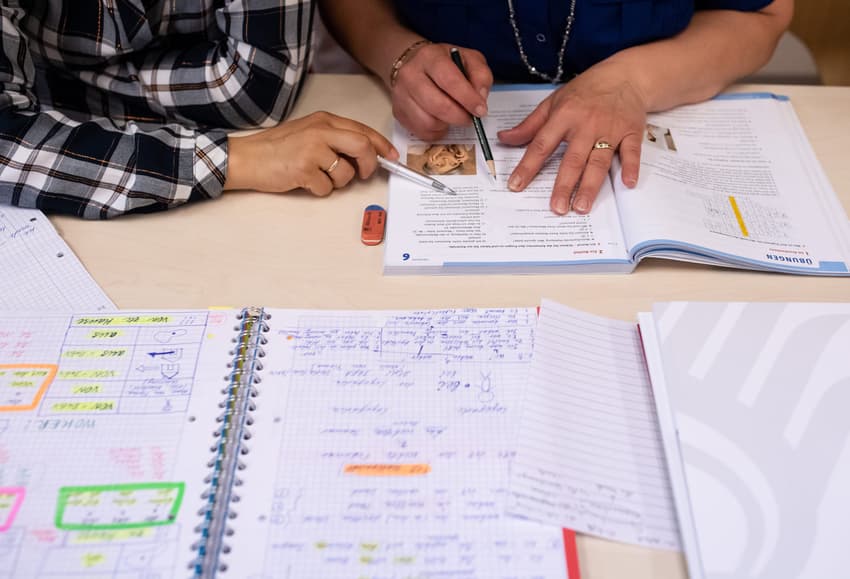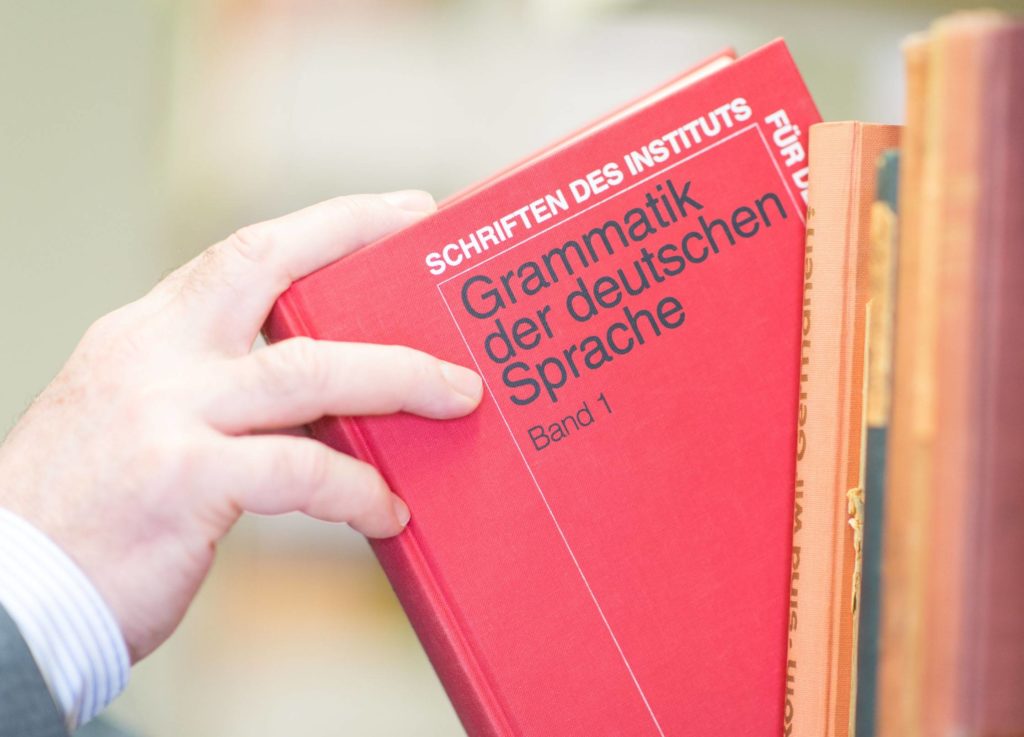'Memorise grammar': How foreigners in Germany passed the B1 language test for citizenship

News that the federal traffic light coalition will soon allow dual citizenship has more than a few long-term residents booking their language tests. So how hard is the B1 test? We asked a few people who’ve done it.
German citizenship laws are set to get a big overhaul this year, but at least one requirement will remain the same – the B1 German language test for people who want to get citizenship on a standard track.
In addition to allowing dual citizenship, the German government’s new draft nationality law is set to reduce the amount of time someone needs to have been resident in Germany from eight years to five for a standard track. Applicants on a fast track will be able to get citizenship after just three years – if they can pass a C1 German exam.
That fast track is down in time from six years but carries a higher language requirement than the current fast track ask of B2 German.
If you’ve been a resident for at least five years though, most of your requirements generally stay the same. You won’t have to renounce your other passports, but you’ll need to pass both the German citizenship test and a B1 language test – just as you do now.
READ ALSO: TIMELINE: What happens next with Germany’s plans to allow dual citizenship?
What does B1 level mean? What can a B1 speaker do?
A B1 speaker is classed as having an intermediate level of command in a language under the Common European Framework for Languages. There are six possible levels, with B1 being the third.
A B1 speaker should be able to communicate with native speakers without a lot of help, at least about everyday topics or even certain subjects they might be more familiar with, such as their hobbies or a bit about the work they do.
With this level, a B1 speaker would also be able to handle most situations that would come up on a trip, explain simple opinions, and describe events.
READ ALSO: What we know so far about the planned language requirements for German citizenship
How does the B1 exam work and how hard is it?
Like most German exams, the B1 exam is divided into four sections – speaking, reading, writing, and listening. You need to get 60 percent to pass the exam.
Most Local readers we asked said that, with a little preparation, the B1 exam is nothing to be scared of.
“I actually found it quite easy,” says Fraser Seifert, a New Zealander coming up on his fifth year in Germany. Seifert took an intensive class that gave him a lot of practice material. “Find as many practice exams as you can. If you can find a preparation class, I found it super helpful.”
Taking so many practice exams, Seifert says, will help you understand exactly what the exam is asking you to do.
“I knew that in order to pass the writing section, I had to put certain grammatical clauses in each paragraph or sentence and write them in a specific format,” he says. “It’s very formulaic.”

The B1 test is full of writing exercises that will test specific points of German grammar. Many readers recommend getting special study material. Photo: picture alliance / dpa | Uwe Anspach
Local readers also suggested using several online resources to help out, especially if you haven’t really done conventional language learning, like in a class.
“I picked up my German from speaking, so had to hit the grammar books to iron out a few irregularities,” says Beth Ingham. She’s already passed her B1 test and is going for her C1 soon.
READ ALSO: EXPLAINED: A language teacher’s guide to passing the German tests for citizenship
Ingham recommends the VHS Lernportal.
“I would recommend memorising phrases which show off your command of grammar – ie. dative, adjective endings,” says Emma Midgley. "Find a textbook with grammar drills that you can practice."
Midgley also recommends the Coffee Break German podcast.
"I went through the practice exams that Goethe Institute provided as well as a textbook for the exam prep,” says Jon Morris. “I also arranged a few 30-minute language exchanges with native speakers to go through the oral exam stuff."
Another thing to prepare for is the exam environment itself.
"I remember the reading and writing elements being in one classroom laid out like an exam hall and then the speaking exam was in a much more relaxed environment," says Charlie D., a Brit based in Bielefeld who did his exam after going to evening classes twice a week for three months.
"I ended up having a very good conversation with my examiner and getting 100 percent for that part of the exam."
READ ALSO: How hard is the C1 language test for Germany’s upcoming fast-track citizenship?
Comments
See Also
German citizenship laws are set to get a big overhaul this year, but at least one requirement will remain the same – the B1 German language test for people who want to get citizenship on a standard track.
In addition to allowing dual citizenship, the German government’s new draft nationality law is set to reduce the amount of time someone needs to have been resident in Germany from eight years to five for a standard track. Applicants on a fast track will be able to get citizenship after just three years – if they can pass a C1 German exam.
That fast track is down in time from six years but carries a higher language requirement than the current fast track ask of B2 German.
If you’ve been a resident for at least five years though, most of your requirements generally stay the same. You won’t have to renounce your other passports, but you’ll need to pass both the German citizenship test and a B1 language test – just as you do now.
READ ALSO: TIMELINE: What happens next with Germany’s plans to allow dual citizenship?
What does B1 level mean? What can a B1 speaker do?
A B1 speaker is classed as having an intermediate level of command in a language under the Common European Framework for Languages. There are six possible levels, with B1 being the third.
A B1 speaker should be able to communicate with native speakers without a lot of help, at least about everyday topics or even certain subjects they might be more familiar with, such as their hobbies or a bit about the work they do.
With this level, a B1 speaker would also be able to handle most situations that would come up on a trip, explain simple opinions, and describe events.
READ ALSO: What we know so far about the planned language requirements for German citizenship
How does the B1 exam work and how hard is it?
Like most German exams, the B1 exam is divided into four sections – speaking, reading, writing, and listening. You need to get 60 percent to pass the exam.
Most Local readers we asked said that, with a little preparation, the B1 exam is nothing to be scared of.
“I actually found it quite easy,” says Fraser Seifert, a New Zealander coming up on his fifth year in Germany. Seifert took an intensive class that gave him a lot of practice material. “Find as many practice exams as you can. If you can find a preparation class, I found it super helpful.”
Taking so many practice exams, Seifert says, will help you understand exactly what the exam is asking you to do.
“I knew that in order to pass the writing section, I had to put certain grammatical clauses in each paragraph or sentence and write them in a specific format,” he says. “It’s very formulaic.”

Local readers also suggested using several online resources to help out, especially if you haven’t really done conventional language learning, like in a class.
“I picked up my German from speaking, so had to hit the grammar books to iron out a few irregularities,” says Beth Ingham. She’s already passed her B1 test and is going for her C1 soon.
READ ALSO: EXPLAINED: A language teacher’s guide to passing the German tests for citizenship
Ingham recommends the VHS Lernportal.
“I would recommend memorising phrases which show off your command of grammar – ie. dative, adjective endings,” says Emma Midgley. "Find a textbook with grammar drills that you can practice."
Midgley also recommends the Coffee Break German podcast.
"I went through the practice exams that Goethe Institute provided as well as a textbook for the exam prep,” says Jon Morris. “I also arranged a few 30-minute language exchanges with native speakers to go through the oral exam stuff."
Another thing to prepare for is the exam environment itself.
"I remember the reading and writing elements being in one classroom laid out like an exam hall and then the speaking exam was in a much more relaxed environment," says Charlie D., a Brit based in Bielefeld who did his exam after going to evening classes twice a week for three months.
"I ended up having a very good conversation with my examiner and getting 100 percent for that part of the exam."
READ ALSO: How hard is the C1 language test for Germany’s upcoming fast-track citizenship?
Join the conversation in our comments section below. Share your own views and experience and if you have a question or suggestion for our journalists then email us at [email protected].
Please keep comments civil, constructive and on topic – and make sure to read our terms of use before getting involved.
Please log in here to leave a comment.